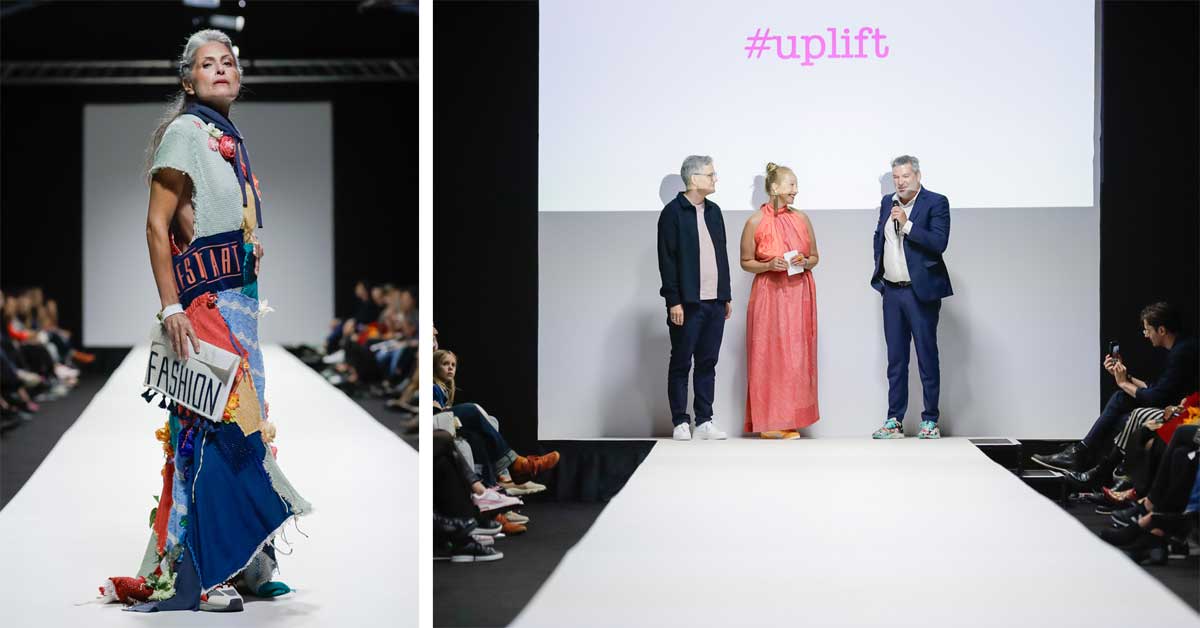

14 September 2024
 Some runway shows seem to prove that designers have a problem with fashion. This can be interpreted in different ways. In the following case, designers were invited to promote new approaches to social issues - especially concerning the poorest in Austria - by using their skills to show what can go wrong. The results surpassed all expectations. The outfits that the 'Uplift' project presented at Vienna Fashion Week are anything but upcycled pieces that fulfill the wishes of those who need all-weather clothing for the next months, warm pieces and perhaps also innovative designs such as a jacket with an integrated foldable light tent with a cold-repellent layer in the back pocket. Fashion.at looked through the pictures of the fashion show that took place this Thursday in the tent in front of the MuseumsQuartier in Vienna. The eye-catching material and color mixes of jeans, knitwear, lace, etc. were rather used for fashion dares or as a costume for the carnival party, perfectly suited to slip into the role of the 'Ucycling Queen'. And that was the goal of the project: to show the discrepancy between clothing donations and the real needs of the homeless. The creations were available for 250 Euros. This amount goes back to Caritas and is then available for the homeless center 'Die Gruft'. The message that our society has many problems, not just fashion-related, but structural problems that cause social inequalities and the mismatch between donations and the real needs of the poor and homeless, was successfully spread. Partner of the project 'Uplift' during the Vienna Fashion Week was the LBG OIS Center, the Open Innovation in Science Center of the Ludwig Boltzmann Gesellschaft. Every year in Austria, about 220,000 tons of used clothing end up in the garbage (source: Austrian Environment Agency https://www.umweltbundesamt.at/en/news220207en) or - which is an advantage, especially if the pieces can be worn again - as donations to non-profit organizations like Caritas. However, to meet the specific needs of the homeless, most donations have to be modified, according to a press release sent out this week by the Ludwig Boltzmann Gesellschaft. In addition, according to Caritas (cited in the press release), about 80 percent of the donated clothing is women's fashion, while about two-thirds of all registered homeless people in Austria are male. The LBG OIS Center, known for its focus on researching health and social inequalities, saw an opportunity to raise the awareness of these disparities by collaborating with Nunu Kaller and local designers. The Center's involvement stems from its broader mission to integrate marginalized groups into research and to develop solutions that bridge the gap between available resources and real needs. Georg Russegger, director of the LBG OIS Center, emphasized that supporting the Uplift project is in line with their goal of using creative methods to promote social and health justice. The Center's Inclusion Health team, as part of its initiative to address health disparities, recognized that the fashion industry platform could be an effective way to raise awareness of the challenges faced by vulnerable populations. By participating in Vienna Fashion Week, the LBG OIS Center aims to not only highlight the pressing issue of clothing donation disparities, but also to promote sustainability and inclusion. The 'Uplift' project exemplifies how artistic and innovative approaches can contribute to meaningful social change, aligning with the Center's commitment to fostering social innovation and addressing systemic inequalities. Images, from left: Long dress by the label 'MarS-Anfertigung' by Marlen Sabetzer for the 'Uplift' project on the runway of Vienna Fashion Week on September 12, 2024. Right: The picture shows Adis Šerifovic from the Inclusion Health Team of the Ludwig Boltzmann Gesellschaft (LBG) Open Innovation in Science Center, the project's co-initiator Nunu Kaller from the agency 'Think Kallerful', who organized the collaboration with the 13 local designers, and Georg Russegger, Director of the Vienna-based LBG OIS Center. Photos: © Vienna Fashion Week / Thomas Lerch. |